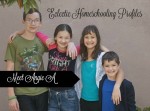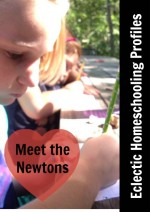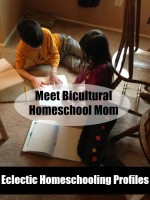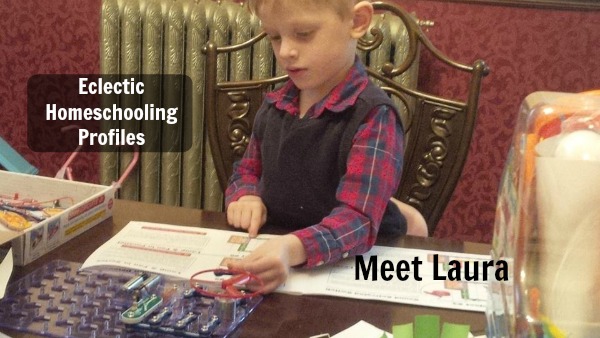
Eclectic homeschooling involves meshing different educational philosophies and methods into something that works for your family. As a result this will look different from family to family. We are featuring a series of interviews with eclectic homeschoolers to show how varied eclectic homeschooling can be.
Meet Laura!
Why did you decide to homeschool?
Initially, the idea came to me as an easy alternative to the vaccine waiver process. However, as my baby grew, I just saw homeschooling as the natural thing for us to do. I had helped her learn and grow those few years and I just wanted to keep on doing that.
How long have you been homeschooling?
Well, my eldest is almost 7, so I’ve technically been homeschooling almost 7 years. However, I really got a lot more organized and deliberate about her studies 3 years ago.
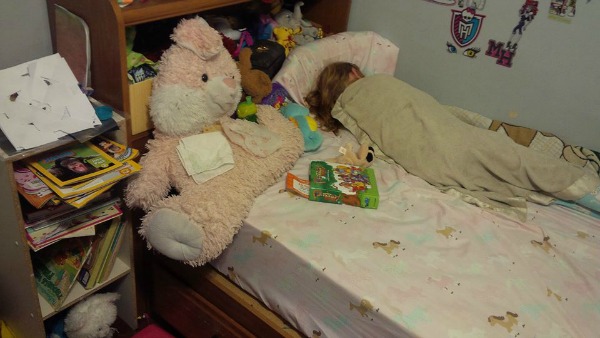
What ages/grades are you homeschooling?
My almost 7-year-old is considered to be in 2nd grade, then I have a 4-year-old and a 3-year-old who are learning basic preschool things.
What were your results on the What Kind of Homeschooler Are You Quiz?
Score for Waldorf Education: 15
Score for Traditional Education: -15
Score for Unit Studies Education: 15
Score for Montessori Education: 18
Score for Thomas Jefferson Education: 13
Score for Unschooling: 23
Score for Classical Education: 3
Score for Charlotte Mason Education: 23
Use 3 words to describe your homeschool:
relaxed, child-led, eclectic
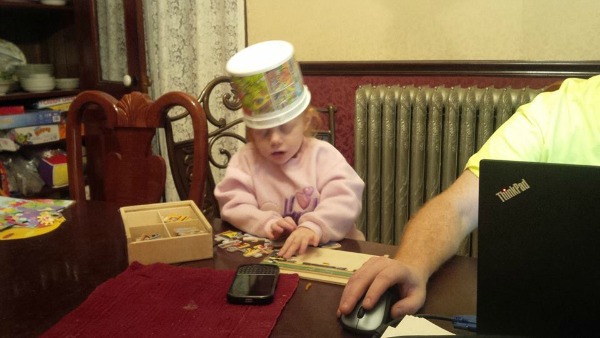
What makes your homeschool eclectic?
I am a big fan of DIY and the thought of a pre-made curriculum, a lesson plan, or a schedule turns me off. We learn from a great many resources, most of which are not meant to be used as a curriculum even for one subject. We explore various resources along the way and if something works we do it again. For example, my daughter likes Highlights Top Secret Adventures and Which Way USA for geography, so we have a subscription. I run out of science ideas quickly, so we buy science experiment kits, such as the Magic School Bus ones. For grammar, reading, and spelling I simply allow her to read as much as she wants every night in bed. I figure she’ll pick up on most of the rules of English that way.
Have you always been an eclectic homeschooler?
Yes.
What do you think makes your homeschool unique?
Along with being eclectic, we are child-led to the point where I wonder if we are unschoolers. However, I suppose most unschoolers don’t do end-of-year testing or set limits on certain things. We do those things, and we utilize workbooks and textbooks occasionally as well.
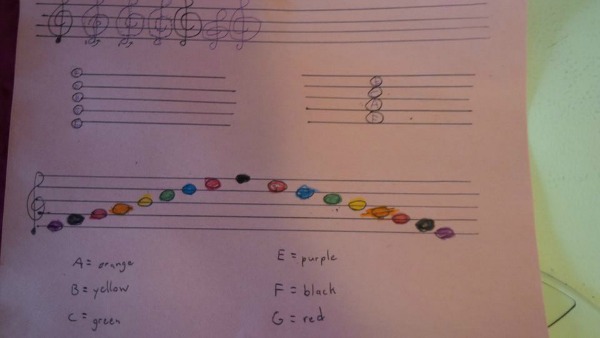
What does a typical day or week look like in your homeschool?
Most days begin with my kids getting up before me. I leave them snacks and water cups and they also have their toys and sometimes the TV. When I get up I make sure everybody has a nutritious breakfast, and then we go about our day. When we are staying home, the kids will either go off to play after breakfast (so I will do some housework) or they will want to do something with me. On days when we stay home, the kids or I will come up with ideas of what to do together (there is a no-screen-time-during-the-day rule here). The day is usually a mixture of housework, free play, and focused interaction. As an example of this type of activity, I might tell my kids about the half-page stories I used to be assigned in second grade and see if they want to try it. Some will and some won’t. The other day I asked who wanted to experiment with litmus paper and learn about acids and bases (2 out of 3 did). Alternatively, one of the kids might be the one with the idea. My daughter might ask me to read our latest historical fiction to her (we use this method for history). My son might ask me to get out his workbook and help him with it. Everybody gets a turn. On days when we go out of the house, it’s usually either for an outside class (like gymnastics or ice skating), a “field trip” (like to the science museum), to run errands, or for a doctor’s appointment. Then the time we have left at home is usually prioritized for housework and resting. We do a lot of learning on the go, though. We’ve had some pretty in-depth discussions in the van just from someone asking a simple question. Then of course there is real life experience such as spending money on groceries, reading road signs, or how to interact in society.
What curriculum has worked in your homeschool?
I never thought I would use any curriculum, but Life of Fred is the only one I have purchased so far. It gets sporadic use (since my kids get to decide what to do and when) but it is a constant on our dining room shelf (where we keep many of our “school” resources). The rest of the time we still get math practice with baking, making purchases, workbook pages, etc. We also have been into Music for Little Mozarts piano books (lesson books and workbooks).
Do you have any favorite homeschooling books?
No, I actually just gained a lot of knowledge, advice, and confidence via a Yahoo! Group “daily digest” e-mail. Lots of the people in my region seem to have the experience to know not only the state regulations like the back of their hands, but also just how well kids learn without needing to be pushed in the mainstream school fashion. I am grateful for their support. I can remember especially reading about kids who weren’t really into reading much even though they were “behind” their public school peers but, in every case I read about, the child eventually progressed rather rapidly once he became interested in his own timing. It gave me the confidence to wait on my daughter without pushing her and, sure enough, she is now quite the reader! I suppose this e-mail list of regional homeschoolers gave me the reassurance necessary for me to allow our homeschool to be as relaxed as we need it to be.
Do you tweak curriculum to work for you? Describe how you do that.
Describe how you do that. We have only made minor changes in the resources we’ve used. The simplest example is that I will read just about any book aloud to my kids (for history, reading, or just for fun) but I will occasionally skip a few lines or change the wording to make it more kid-friendly. In our Music for Little Mozarts piano book, I noticed that there was little emphasis on what I consider to be the basics, so I took time out to make my own flash cards and worksheets to practice rhythms and identifying notes on the staff. My kids seem to get a kick out of the homemade worksheets, so now I get asked to make them for just about everything!
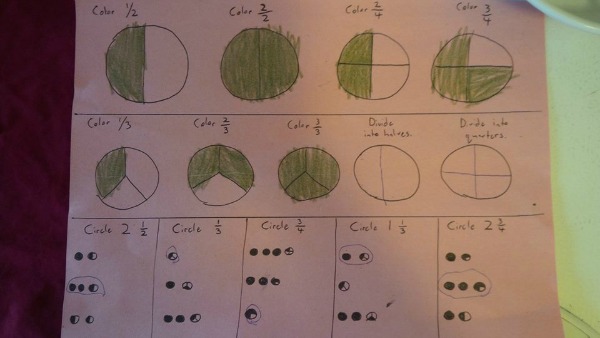
Anything else you would like to share:
I suppose my philosophy is that you can learn anything you are made to but you’ll probably forget it after the test. That’s why we do child and parent co-led learning, with the kids having so much say in what they learn and how they learn it. There are so many different ways to learn something, and as long as they can get the basics to function in society, learn how to learn, and figure out where their passions lie, I think they can get wherever they want in life. I also work towards balance. I may sleep in while my kids get up, but I spend quality time with them during the day and make sure they are taken care of. We may spend most of our time in pajamas (or naked if you’re one of the little ones) but we are fed, warm, healthy, loved… I may spend a lot of time with my kids and then doing housework but at night when they’re in bed I watch TV and sew or knit, and on weekends I let them have unlimited screen time so I can be lazy for a little bit. Balance!

